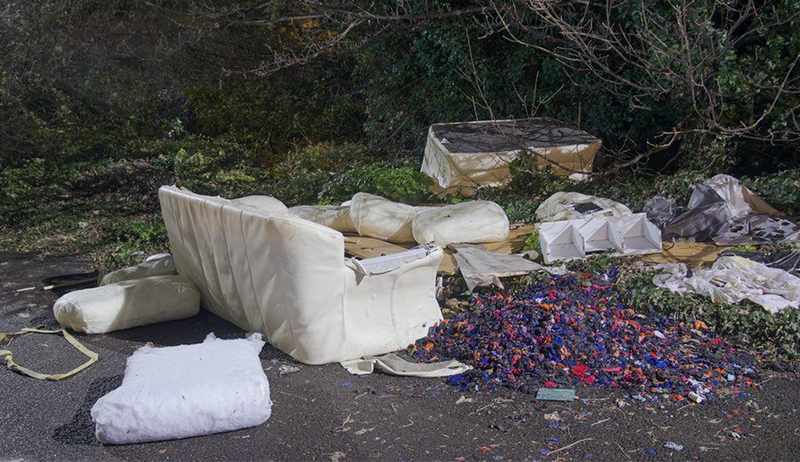
Waste Removal Information and FAQs
Let’s face it during the pandemic everyone required waste removals and this lead to lots of un-licenced waste carriers offering “cheap tip runs” and whilst this is not very well known, potential customers were booking in their thousands but did you know you run the risk of a £5,000 fine each time you use an unregistered waste removal company?
I have a regular customer (letting agent) that I try to educate, but they don’t quite get the concept that old furniture is classed as waste and thinks that they can get anyone to do a tip run, because waste is just classed as “bin bags” or other waste as we’d assume to be going the tip. Waste is anything that is going to be recycled, be it old mattresses, bedroom or household furniture.
Customer responsibility
Customers have a legal duty to ensure that their waste is only passed onto authorised waste carriers. If you pay to have your waste taken away, the business or individual must be registered as an upper tier waste carrier with the Environment Agency, their waste carrier register is free to check here – there’s no secrets, special codes or anything, so if a waste collector suggests showing you their tip permit when they collect the waste, ask yourself why are they being secretive.
If they are unable to prove that they are an authorised waste carrier do not allow them to take your waste. It’s that simple!
If you pass your waste to an unauthorised waste carrier and that is then fly-tipped, you would face a fine or prosecution if the waste is traced back to you and you had failed to take the steps to check if they were authorised to take it (checking the website above).
Please note that a waste carrier license is NOT a vehicle permit issued by the local authority, it comes in various forms:
- Website listing on Environment Agency
- Certificate available to download with company information on it
- Environment Agency card with company information on it
Whilst I understand that there is sometimes confusion surrounding your local authority permit scheme, this is simply to allow local residents access in their personal vehicle to dispose of personal waste – not commercial waste.
When does waste become commercial?
Almost as soon as there’s payment or reward for the removal. Whether you are a local resident or business and you pay someone to remove waste, it automatically becomes commercial waste and is required to go to a commercial waste transfer centre for recycling.
Why can’t you just take it the tip?
The tip or as they’re known (Household Recycling Centres) are for residents in that local authority, to take their own waste, this is provided free of charge and businesses or individuals cannot dispose of their waste here. Instead, they must go to a commercial waste transfer station and pay to dispose of the waste.
Before booking someone on social media ask them these 5 questions:
- Are you registered with the Environment Agency?
It’s a basic point that is often, rather worryingly, overlooked. Only organisations that are registered as waste carriers with the Environment Agency should be used to remove waste. Carriers that aren’t registered are operating their business illegally and organisations disposing of waste risk criminal prosecution and civil liability if they employ their services. At the outset, waste partners should be asked to show proof of registration. If they are unable to provide this, then look elsewhere. - What insurance policies do you have in place?
It is important to check that waste carriers have the appropriate insurances in place to cover them for transporting the waste, such as vehicle and public liability insurance. Having insurance for general removals isn’t enough – it specifically needs to cover waste to be within the law. Again, ask to see documentation and if they are unable to provide this, look elsewhere. - Do you provide waste transfer notes?
Every time control of waste is transferred from one party to another, it must be accompanied by a Waste Transfer Note (WTN) which is sometimes referred to as a ‘Duty of Care Notice’. This is a legally required document that represents the transfer of ownership and responsibility of the waste from the disposing organisation to the waste carrier. If waste is not disposed of in accordance with the law and the disposing organisation has no waste transfer note to prove it handed responsibility for the waste to a contractor, it leaves the organisation open to prosecution – it’s the customers’ responsibility to request this, not the waste carriers to provide. The law states this as the customers’ requirement. It would not be a legal argument to state “I didn’t get one” as it’s the customers’ responsibility to get it. Our waste transfer notes are delivered online, via our website and are stored electronically on our secure server. - Can you provide evidence of final disposal?
It takes little effort for a waste carrier to provide a tipping receipt and other evidence of final disposal. This, of course, should reconcile to the WTN given for the initial waste collection. Although it could take time to get this information, and the tipping receipt might also relate to a load that includes waste from another client of the waste collector, reconciliation should still be possible. Therefore, it’s crucial to check that any potential waste partners are happy and able to provide this information – ask for examples of evidence supplied to other clients. It will offer peace of mind about the waste audit trail and allow a much better understanding of how much waste is avoiding landfills. - Do you have separate arrangements for collecting hazardous waste?
Hazardous waste, such as fridges, TVs, computer monitors and fluorescent lamp tubes, should not be bundled in with general waste, and should only be disposed of at facilities that are licensed to handle such waste. When asking potential waste partners about their procedures for collecting hazardous waste, there are three important things to look out for.
Firstly, in addition to standard WTNs, waste carriers should be supplying hazardous waste consignment notes to their clients, copies of which should be kept for three years – so ask to see examples of some that have been provided to other clients.
Secondly, expect higher disposal fees, because it is more costly to dispose of hazardous waste at a facility that is properly licensed to handle it. Thirdly, ask for evidence of ultimate disposal, to prove hazardous waste is disposed of via the appropriate channels.
For further information, please contact us with your questions as we are happy to advise, check out companies or individuals for you and remember – it’s always the customers’ responsibility to ensure that you have completed the necessary checks. Do not take their word for it as most individuals are out for a quick quid.
It’s easier to walk away from a potential fly-tipper and get a legitimate company to dispose of your waste than sit in a police cell and undergo an interview under caution for environmental crimes and end up in the dock in your local magistrates or crown court depending upon how the CPS wish to dispose of your case.
Further reading can be found here – Waste: Detailed information









